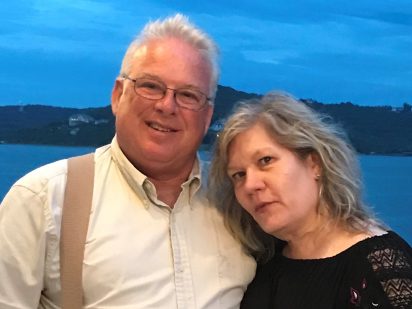Steve Rutz didn’t realize North Dakota had so many birds. For the longest time, he couldn’t hear them.
Now, the chattering of nature and most every other sound are crystal clear, thanks to hearing aid technology prescribed by Trinity Health Audiology.
“I can hear flocks of geese, birds singing, the crinkling of a potato bag. Now my wife asks me to turn up the radio and TV!” he said with a chuckle.
A 56-year-old driver with DNOW, Steve recognized that his hearing loss was getting to be an issue at home and at work. “It frustrated my co-workers,” he said. “They could tell I was frustrated because I couldn’t hear them unless they were speaking directly to me. With the hearing aids, that’s all changed.”
Steve also suffered from chronic tinnitus, which kept him awake at night. “Even the tinnitus has disappeared. I should have done this years ago,” he added.
Steve credits his primary care physician, Howard Reeve, MD, for setting his hearing remedy in motion. A board-certified family physician, Dr. Reeve also specializes in occupational medicine and is certified to perform Department of Transportation (DOT) physicals for commercial drivers like Steve. One element of a DOT physical is a “whisper test” in which a patient stands five feet from the examiner while words or numbers are whispered. If the individual fails, an audiometric test is required.
“Unbeknownst to me, Dr. Reeve scheduled me for an audiology exam,” Steve said. “I’m so glad he did.”
He was pleased to see that Trinity Health Audiology offers early morning appointments. He was able to meet with Kylie Harris, AuD, CCC-A, at 7:00 a.m., which got him back to work in due course. Harris, like her colleagues, Jerrica Maxson, AuD, CCC-A and Tricia Nechodom, AuD, PASC, has a Doctor of Audiology credential, which means she is a specialist in identifying, diagnosing, and treating hearing disorders, and prescribing assistive devices likes hearing aids. She performed a thorough hearing test on Steve and, not surprisingly, she identified severe hearing loss in both of his ears.
“We talked about different hearing aid options – behind the ear, in the ear, rechargeable, what my insurance might cover,” Steve said. “I decided on what I felt most comfortable with.”
Conversations about hearing aids invariably include high-tech topics such as hearing aid apps and smartphone connectivity. Many hearing aid manufacturers use apps on cellphones to control the settings of hearing aids using the phone as a remote control. Users are able to adjust the volume, noise reduction, and sound quality of their hearing aids using their phones.
“I have fat fingers, so it’s a big convenience for me to be able to control settings from my phone,” Steve said. His hearing aids also connect to his cellphone via Bluetooth technology so he’s able to hear his phone calls streamed directly through his hearing aids hands-free.
But bells and whistles aside, Steve says the most valuable aspect of his new hearing aids is the impact on his general health and well-being.
“The most dramatic change has been their effect on my overall health. From a mental health perspective, it’s like a weight has been lifted. You don’t realize how much energy you use up just trying to hear. You find yourself blaming others for not speaking up. I feel happier now; I know I’m a much more pleasant person to be around,” he said.
What would he say to someone who has put off getting hearing aid devices? “I would say don’t wait. There’s no downside. It has been very beneficial to me for the workplace and home life. I procrastinated way too long.”
Trinity Health Audiology is located at Health Center – West, 101 3rd Ave SW, Ste 203, Minot. For appointments or consultations, please call 701-857-5986.

